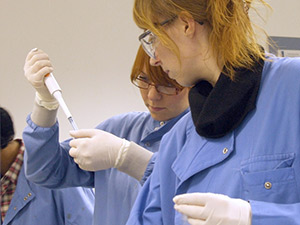Women in science – Chrisa Tsiarigli
Posted Wednesday 23 April 2014

This week we find out about Chrisa Tsiarigli, who graduated in 2002 with a Geographical Information Systems with Business Management BSc(Hons). She is currently a principal public health intelligence specialist for the NHS south-west London sector.
How did you first become interested in science?
At school I always excelled in maths and physics, but I had a keen interest in geography as well and contemplated studying geography. After discussing alternative career paths with a professor from Kingston University, I decided to study geographical information systems instead. I chose to combine my course with business management, which would offer me an advantage if I was to apply later for more senior and managerial positions.
What did you do after leaving Kingston?
I was accepted by UCL to do a Remote Sensing and Photogrammetry MSc, but I decided that I wanted to attain some work experience first. I initially worked as a researcher/analyst for The Local Futures Group Ltd, a geography think tank company in Holborn for a year, then moved to the Greenwich Primary Care Trust in the Public Health Department as a public health intelligence analyst.
Three years later I joined Islington Primary Care Trust where I was a senior public health intelligence analyst. By then I'd decided that I wanted to advance my career in this field. After a further three years I moved to my current job as the principal public health intelligence specialist – NHS south west London sector.
What's it like being a woman in the scientific workplace?
I've never been treated differently because I am a woman. I believe that if you are professional and try to excel in your work you can achieve a lot and gain a very high status. This is the same for everyone regardless of gender. Passion and dedication to your work are far more important.
How can society encourage more women into science?
There are more organisations that support women in science now than before, such as the Women in Science Awards. Schools need to promote skilled females to study science. Additionally, universities and other higher educational institutions need to give awards to females who excel in science and help them to be placed in the right organization after they leave, where their skills and talent will be rewarded.
How easy is it to get back in after a career break?
Working for the public sector gives you the flexibility to have career breaks and be able to return to your position. You receive six months and sometimes more of paid maternity leave. You can also take a gap year out, or obtain a secondment. My organisation offers extensive training and support, so when someone returns to work from a career break they can adapt fairly quickly.
Have any doors opened as a result of your science education outside the field?
Apart from science, I've always had an interest in law as well. While I was working at Islington PCT I decided to study part time in the evenings at The University of Law in Bloomsbury for the Graduate Diploma in Law, which I completed successfully in 2010. I'm currently training part time at weekends to become a barrister. Whatever your degree, you can do a law conversion course and further training if you wish to become a solicitor or a barrister. Some areas of law, like IT and intellectual property law, need graduates from scientific disciplines who have the necessary expertise to understand complicated scientific issues. Therefore, my science background will be extremely useful if I decide to go into more technical areas of law.
Are there certain skills which women can offer in the science and technology world compared to men?
Women have a lot more patience than men and science needs large amounts of patience!
How well paid is a science career?
It depends on the area you're in. The private sector – especially large companies, such as pharmaceuticals – can pay a lot more than the public sector. This is of course based on the skills and the experience you have. The public sector offers greater stability and more flexibility, and as you further your career, your earnings increase.